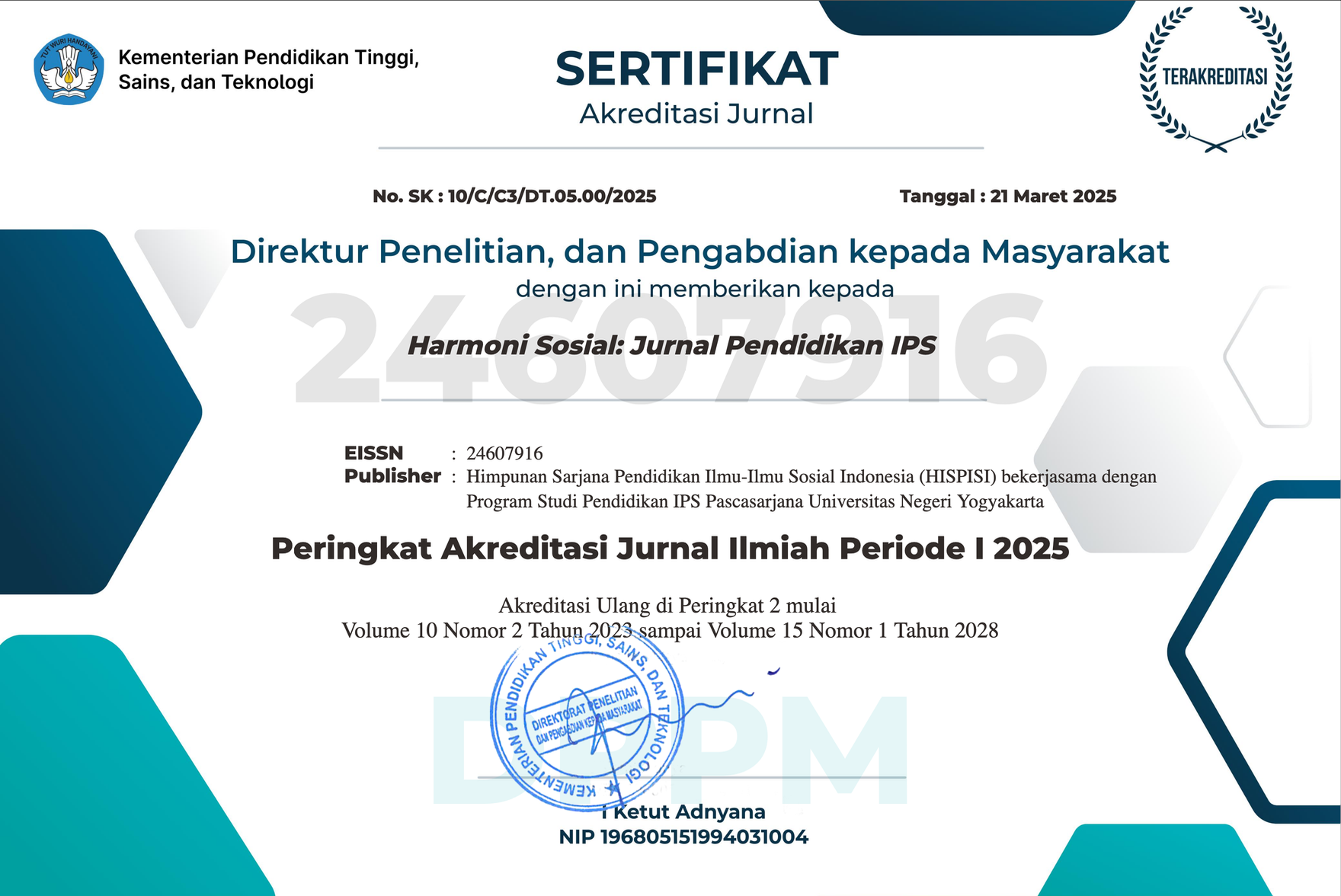Web-based mind mapping learning media to increase understanding of economic policy materials
Downloads
Downloads
Abi"El"Mona, I., & Adb"El"Khalick, F. (2008). The influence of mind mapping on eighth graders' science achievement. School Science and mathematics, 108(7), 298-312. doi:https://doi.org/10.1111/j.1949-8594.2008.tb17843.x
Arikunto, S. (2007). Prosedur penelitian suatu pendekatan praktik. Jakarta: PT Rineka Cipta. doi:https://doi.org/10.1029/1998JC900010
Arikunto, S. (2012). Dasar-dasar evaluasi pendidikan (2nd ed.). Jakarta: Bumi Aksara.
Arsyad, A. (2011). Media pembelajaran. Jakarta: Rajawali Pers.
Aulia, S. (2014). Penerapan model mind mapping dan inside-outside circle untuk meningkatkan aktivitas dan hasil belajar PKN siswa kelas V SDN Pelambuhan 7 Banjarmasin (Unpublished bachelor thesis). Universitas Negeri Malang, Malang.
Bergdahl, N., Nouri, J., Fors, U., & Knutsson, O. (2020). Engagement, disengagement and performance when learning with technologies in upper secondary school. Computers & Education, 149, 103783. doi:https://doi.org/10.1016/j.compedu.2019.103783
Biktimirov, E. N., & Nilson, L. B. (2006). Show them the money: Using mind mapping in the introductory finance course. Journal of Financial Education, 32, 72-86. doi:https://doi.org/10.2307/41948535
Buran, A., & Filyukov, A. (2015). Mind mapping technique in language learning. Procedia-Social and Behavioral Sciences, 206, 215-218. doi:https://doi.org/10.1016/j.sbspro.2015.10.010
Buzan, T. (2013). Buku pintar mind map. Jakarta: PT Gramedia Pustaka Utama.
Cheng, B., Wang, M., & Mercer, N. (2014). Effects of role assignment in concept mapping mediated small group learning. Internet and Higher Education, 23, 27–38. doi:https://doi.org/10.1016/j.iheduc.2014.06.001
Chuang, Y.-T. (2014). Increasing learning motivation and student engagement through the technology-supported learning environment. Creative Education, 5(23), 1969–1978. doi:https://doi.org/10.4236/ce.2014.523221
Clay, C. (2011). Exploring the use of mobile technologies for the acquisition of clinical skills. Nurse Education Today, 31(6), 582–586. doi:https://doi.org/doi.10.1016/j.nedt.2010.10.011
D'Antoni, A. V. (2009). Relationship between the mind map learning strategy and critical thinking in medical students (Unpublised doctoral dissertation). Seton Hall University, New Jersey.
Daiute, C. (2013). Educational uses of the digital world for human development. LEARNing Landscapes, 6(2), 63-83. doi:https://doi.org/10.36510/learnland.v6i2.605
Darusman, R. (2014). Penerapan metode mind mapping (peta pikiran) untuk meningkatkan kemampuan berpikir kreatif matematik siswa SMP. Infinity Journal, 3(2), 164-173. doi:https://doi.org/10.22460/infinity.v3i2.61
Daryanto, D. (2010). Evaluasi pendidikan. Jakarta: Rineka Cipta.
Evrekli, E., Inel, D., & Balim, A. G. (2011). A research on the effects of using concept cartoons and mind maps in Science Education. Necatibey EÄŸitim Fakí¼ltesi Elektronik Fen ve Matematik EÄŸitimi Dergisi, 5(2), 58-85.
Fu, Q. K., Lin, C. J., Hwang, G. J., & Zhang, L. (2019). Impacts of a mind mapping-based contextual gaming approach on EFL students' writing performance, learning perceptions and generative uses in an English course. Computers & Education, 137, 59-77. doi:https://doi.org/10.1016/j.compedu.2019.04.005
Ghozali, I. (2009). Aplikasi analisis multivariate dengan program SPSS. Semarang: BP UNDIP.
Harmi, H. (2010). Teori belajar dan pembelajaran. Curup: LP2 STAIN.
Kaplan, R. M., & Saccuzzo, D. P. (2001). Psychological testing: Principles, applications, and issues (5th ed.). Thomson Learning.
Karras, D. J. (1997). Statistical methodology: II. Reliability and validity assessment in study design, part B. Academic Emergency Medicine, 4(2), 144–147. doi:https://doi.org/10.1111/j.1553-2712.1997.tb03723.x
Kiong, T. T., Yunos, J. B. M., Mohammad, B. B., Othman, W. B., Heong, Y. M., & Mohamad, M. M. B. (2012). The development and evaluation of the qualities of Buzan mind mapping module. Procedia-Social and Behavioral Sciences, 59, 188-196. doi:https://doi.org/10.1016/j.sbspro.2012.09.264
Otaduy, I., & Diaz, O. (2017). User acceptance testing for Agile-developed web-based applications: Empowering customers through wikis and mind maps. Journal of Systems and Software, 133, 212-229. doi:https://doi.org/10.1016/j.jss.2017.01.002
Prabowo, M. (2010). Pembelajaran di sekolah: Harapan dan kenyataan. Majalah Ilmiah Pembelajaran.
Prayudi, P. (2008). Pengaruh penggunaan strategi pembelajaran mind mapping terhadap prestasi belajar. Jakarta.
Rahayu, A. H., Santosa, S., & Endarto, D. (2015). Upaya meningkatkan motivasi dan hasil belajar geografi melalui penerapan media audio visual dengan metode mind map (Penelitian tindakan kelas pada siswa kelas X-6 SMA Negeri I Kroya, Kec. Kroya, Kab. Cilacap, tahun ajaran 2012/2013). GeoEco, 1(1), 10-17.
Richey, R. (2008). Reflection on the 2008 AECT definitions of the field. TechTrends.
Riduwan, R. (2016). Skala pengukuran variabel-variabel penelitian. Bandung: Alfabeta.
Rusman. R. (2013). Model-model pembelajaran. Jakarta: Rajawali Pers.
Sadiman, A.S., Rahardjo, R., Haryono, A., & Harjito, H. (2007). Media pendidikan. Jakarta: PT Raja Grafindo.
Shoimin, A. (2014). 68 Model pembelajaran inovatif dalam kurikulum 2013. Yogyakarta: Ar-Ruzz Media.
Sim, M.-A. (2012). Mind Mapping and Brainstorming As Methods of Teaching Business Concepts in English As a Foreign Language. Academica Science Journal Psychologica Series No, 1(1), 2012.
Sim, M. A., & Pop, A. M. (2012). Mind mapping and brainstorming as methods of teaching business concepts in English as a foreign language. Academica Science Journal, Psychologica Series, 1, 75.
Sinclair, P.M., Kable, A., Levett-Jones, T., & Booth, D. (2016). The effectiveness of internet-based e-learning on clinician behavior and patient outcomes: A systematic review. International Journal of Nursing Studies, 57, 70-81. doi:https://doi.org/10.1016/j.ijnurstu.2016.01.011
Sudijono, A. (2009). Pengantar evaluasi pendidikan. Jakarta: Rajawali Pers.
Sugiyono, S. (2016). Metodelogi penelitian kuantitatif, kualitatif, dan R&D. Bandung: Alfabeta.
Sukardi, S. (2011). Evaluasi pendidikan: Prinsip dan operasionalnya. Jakarta Timur: PT Bumi Aksara.
Surjono, H. D. (2013). Membangun course e-learning berbasis moodle. UNY Press.
Surjono, H. D. (2010). Pemanfaatan Teknologi Informasi dan Komunikasi dalam Peningkatan Kualitas Pembelajaran. Paper presented at Seminar MGMP Terpadu SMP/MTs Kota Magelang, Magelang, Indonesia.
Thoha, M. C. (2001). Teknik evaluasi pendidikan. Jakarta: PT RajaGrafindo Persada.
Trianto, T. (2014). Model pembelajaran terpadu (Konsep, strategi, dan implementasinya dalam Kurikulum Tingkat Satuan Pendidikan). Jakarta: PT Bumi Aksara.
Yu, J., Zhang, W., Yang, Z., Qin, Z., & Hu, Y. (2020). Cross-modal learning with prior visual relation knowledge. Knowledge-Based Systems, 203, 106150. doi:https://doi.org/10.1016/j.knosys.2020.106150
The Authors submitting a manuscript do so on the understanding that if accepted for publication, copyright publishing of the article shall be assigned to Harmoni Sosial: Jurnal Pendidikan IPS
 | Harmoni Sosial: Jurnal Pendidikan IPS by http://journal.uny.ac.id/index.php/hsjpi is licensed under a Creative Commons Attribution-ShareAlike 4.0 International License. |









 ISSN Print
ISSN Print









